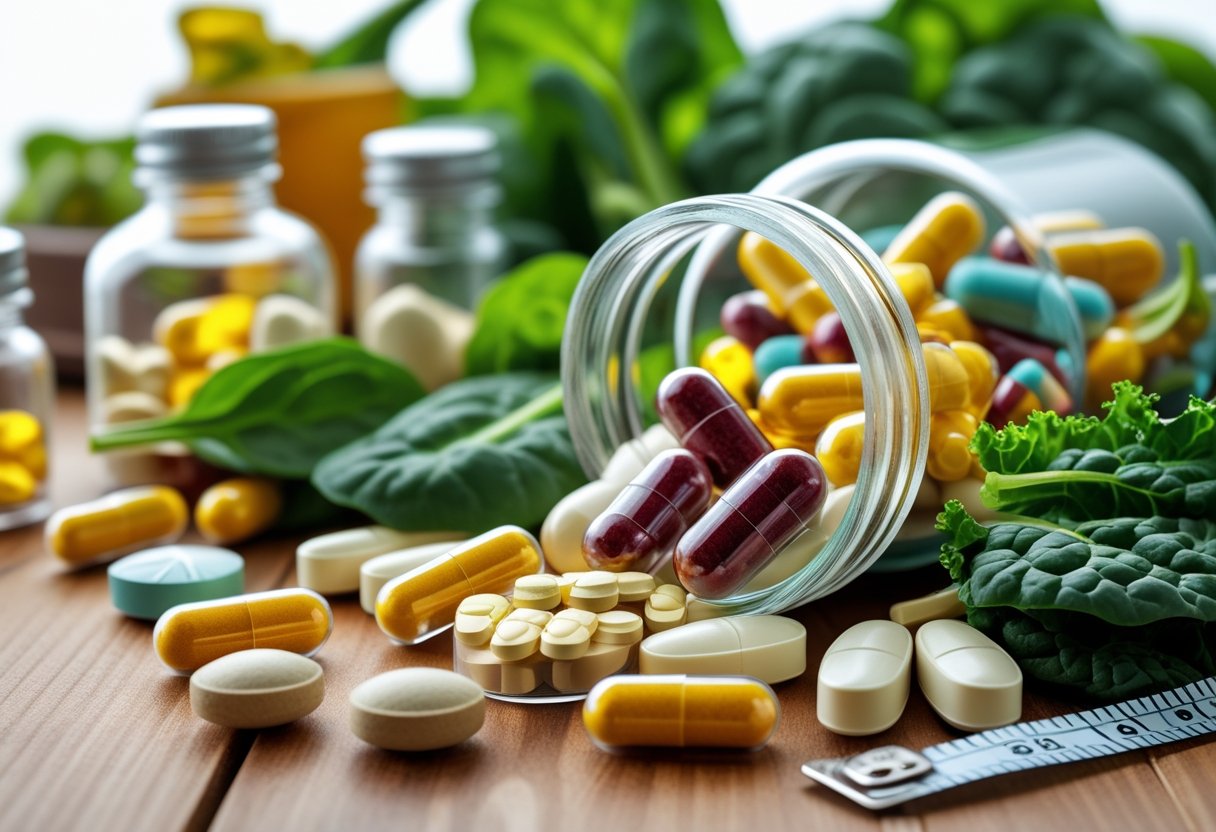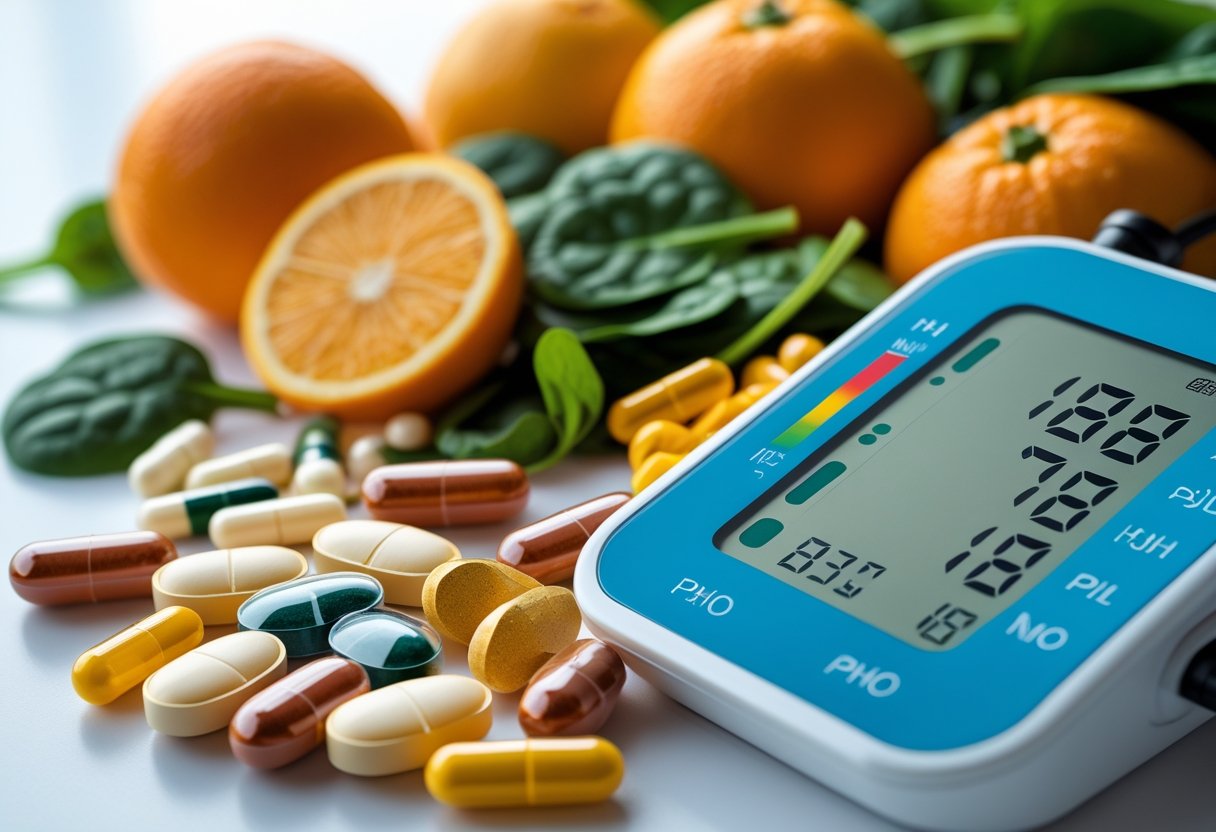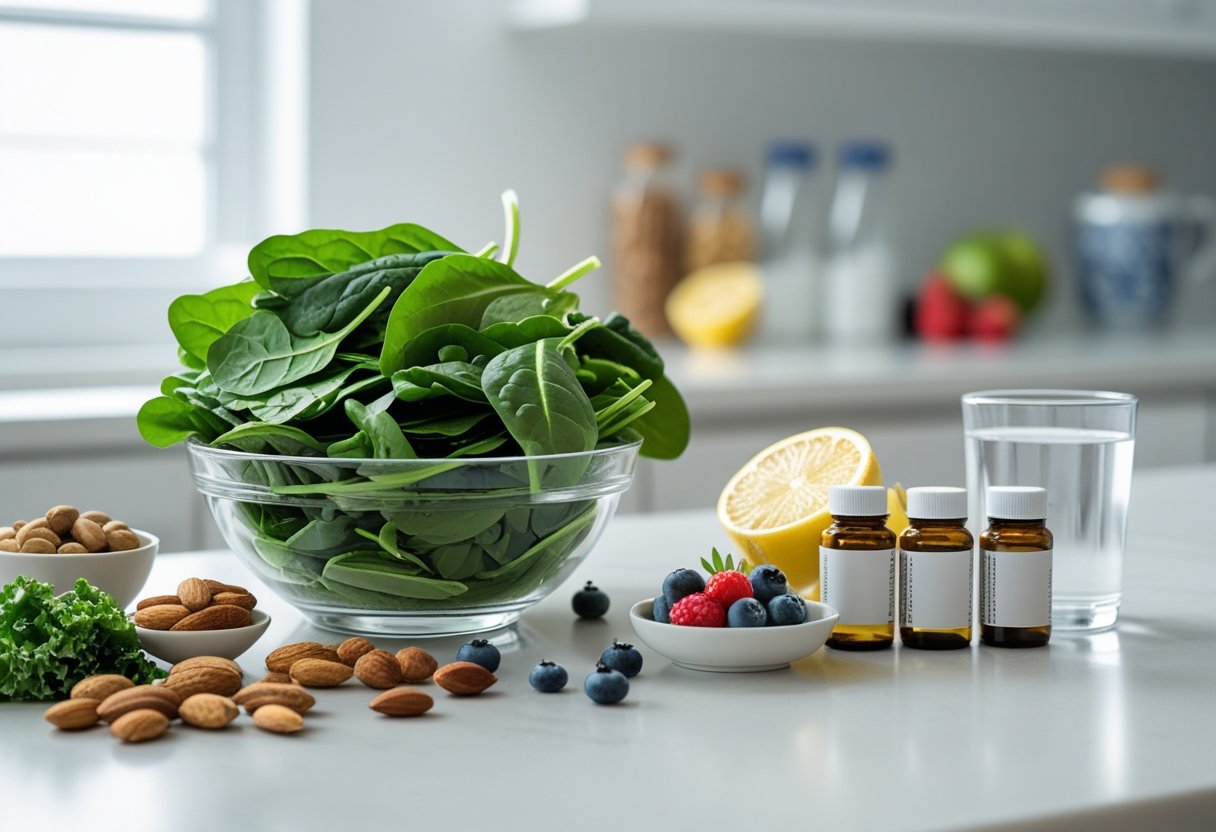Managing high blood pressure often involves lifestyle changes, and certain vitamins can play a helpful role. Vitamins like C, D, and some B vitamins have been shown to support blood pressure control when included as part of a balanced diet. These vitamins may help improve blood vessel function and reduce inflammation, which can affect blood pressure levels.

While vitamins alone won’t replace prescribed treatments, they can be an important part of overall heart health. Research suggests that increasing intake of antioxidants such as vitamin C may be linked to lower blood pressure. Additionally, B vitamins like riboflavin may influence blood pressure regulation in some individuals.
Understanding how vitamins influence blood pressure can help people make better choices about their diet and supplements. It is important to look at these nutrients as one part of a broader plan that also includes exercise, stress management, and avoiding excessive salt or alcohol. For more detailed information, see studies on antioxidant vitamins and blood pressure and the role of B vitamins in blood pressure.
Table of Contents
Understanding High Blood Pressure

High blood pressure occurs when the force of blood pushing against artery walls is consistently too high. This condition can develop because of several reasons and can lead to serious health problems if left unmanaged.
Causes and Risk Factors
High blood pressure can come from many factors. Common causes include excess salt intake, lack of physical activity, and obesity. Age also plays a role, as blood pressure tends to rise with age. Genetics can make some people more likely to develop hypertension.
Other risk factors are stress, smoking, and excessive alcohol use. Some medical conditions, like kidney disease or hormonal disorders, can increase blood pressure too. Diets low in essential nutrients, such as certain B vitamins, may also affect blood pressure regulation.
Health Consequences of Hypertension
When blood pressure remains high, it strains the heart and blood vessels. This can lead to heart attacks, strokes, and kidney damage. High blood pressure is also a major cause of heart failure and can damage the arteries, making them less elastic.
Uncontrolled hypertension can cause damage quietly over years, often without symptoms. Because of the risks, managing blood pressure early is critical to reduce the chances of serious complications.
Role of Vitamins in Blood Pressure Control

Vitamins influence blood pressure by helping blood vessels work properly and reducing damage caused by oxidative stress. Some vitamins act as antioxidants, while others support key processes that maintain healthy circulation.
How Vitamins Affect Circulation
Vitamins like C and E serve as antioxidants that protect blood vessel walls from damage. This protection helps keep vessels flexible and prevents stiffness, which can raise blood pressure.
Vitamin D plays a role in controlling the balance of calcium in the body, which affects how blood vessels contract and relax. Low vitamin D levels have been linked to higher blood pressure.
Vitamin B complex, especially B6, B9 (folate), and B12, helps reduce levels of homocysteine, an amino acid that can harm blood vessels when elevated. Lower homocysteine supports better circulation and blood pressure control. Research shows that antioxidants along with these vitamins may help in reducing blood pressure through these mechanisms.
Nutritional Deficiencies and Blood Pressure
Deficiencies in vitamins C, D, and B complex are linked to poor blood pressure regulation. Lack of vitamin C reduces antioxidant protection, allowing damage to blood vessels that can lead to higher pressure.
Low vitamin D impairs the regulation of calcium and the renin-angiotensin system, a key hormone system controlling blood pressure. This impairment may cause blood vessels to narrow and blood pressure to rise.
Inadequate B vitamins can increase homocysteine, which raises inflammation and damages blood vessels. These effects can contribute to the development of hypertension. Ensuring sufficient intake of these vitamins is important for managing or preventing high blood pressure. For more on how vitamins help with blood pressure regulation, see this study on blood pressure regulation and micronutrients.
Key Vitamins for Managing High Blood Pressure

Certain vitamins play important roles in controlling blood pressure. These nutrients help support blood vessel function, reduce inflammation, and improve heart health. Including key vitamins in the diet may aid in managing high blood pressure effectively.
Vitamin D and Blood Pressure Regulation
Vitamin D affects blood pressure by helping regulate the renin-angiotensin system, which controls how the body balances fluids and salts. Low levels of vitamin D have been linked to higher blood pressure in some people.
Vitamin D also supports the health of blood vessels by reducing inflammation. This can help vessels relax and reduce resistance, lowering stress on the heart.
People with vitamin D deficiencies may benefit from supplements or increased sun exposure. However, vitamin D should be taken carefully and under medical advice, as too much can cause other health issues.
For more on vitamin D’s role in blood pressure control, see this critical review of nutrition and blood pressure.
The Impact of Vitamin C
Vitamin C supports blood pressure management by protecting the endothelium, the lining of blood vessels. It acts as an antioxidant, reducing damage caused by free radicals that can stiffen arteries.
Supplementing with vitamin C has been shown to have a mild blood pressure-lowering effect in some studies, especially in people with hypertension.
Vitamin C also helps improve nitric oxide production, which signals blood vessels to relax. This can reduce vascular resistance and support healthy circulation.
Including foods rich in vitamin C, like citrus fruits, berries, and vegetables, can contribute to better blood pressure control without risks linked to high-dose supplements.
Vitamin B6 and Cardiovascular Health
Vitamin B6 plays a role in reducing homocysteine, an amino acid associated with blood vessel damage and higher blood pressure when elevated.
By lowering homocysteine levels, vitamin B6 helps protect blood vessel walls and supports normal blood flow. This effect may help reduce the risk of hypertension-related complications.
Together with vitamins B12 and folate, B6 participates in one-carbon metabolism, crucial for heart health and blood pressure regulation.
Some evidence suggests B6 supplementation can benefit people with specific genetic factors affecting blood pressure, but it is best used under medical supervision.
More details about B6 and related B-vitamins can be found in this review of one-carbon metabolism and blood pressure.
Additional Vitamins and Nutrients to Consider

Certain vitamins and minerals have shown potential to help manage blood pressure. Their effects vary, but they can support vascular health and aid in blood pressure regulation when included in a balanced diet.
Vitamin E and Its Potential Benefits
Vitamin E works as an antioxidant that protects cells from damage caused by free radicals. This property may help improve blood vessel function and reduce inflammation, both important for healthy blood pressure.
Some studies suggest vitamin E might lower systolic and diastolic blood pressure slightly, especially in people with hypertension. However, results are mixed and not all research agrees on its effectiveness.
Vitamin E is found in foods like nuts, seeds, spinach, and vegetable oils. Taking high doses of vitamin E supplements is not recommended without medical advice, as it may cause side effects or interact with medications.
The Role of Magnesium
Magnesium helps relax blood vessels, which can reduce resistance in the arteries and lower blood pressure. It also supports heart rhythm and muscle function.
Research shows that magnesium supplementation can lead to modest drops in both systolic and diastolic pressure, especially in those with low magnesium levels or high blood pressure.
Good dietary sources include green leafy vegetables, nuts, whole grains, and legumes. Magnesium supplements may be helpful, but it’s best to consult a healthcare provider before starting them to determine correct dosage.
More on vitamins and nutrients for blood pressure can be found in the study on vitamins and hypertension prevention.
Recommended Dietary Sources of Blood Pressure Supportive Vitamins
Certain vitamins can help manage blood pressure by supporting blood vessel health and reducing inflammation. These vitamins are found in a variety of foods, including vegetables, fruits, whole grains, legumes, and animal products.
Vegetables and Fruits
Leafy greens, such as spinach and kale, are rich in folate and potassium, both important for lowering blood pressure. Potassium helps balance sodium levels, which reduces tension in blood vessels.
Berries, oranges, and bananas provide vitamin C and antioxidants. These nutrients support the lining of blood vessels and may improve blood flow. Eating a mix of colorful fruits helps supply a wide range of vitamins and minerals that benefit heart health.
Tomatoes are also good sources of potassium and vitamin C. Raw or cooked tomatoes both retain their blood pressure-supportive nutrients.
Whole Grains and Legumes
Whole grains like oats, brown rice, and quinoa offer magnesium and B vitamins, especially folate. Magnesium helps relax blood vessels, which lowers blood pressure.
Beans, lentils, and chickpeas are rich in potassium, magnesium, and fiber. Fiber improves overall heart health by reducing cholesterol and helping maintain steady blood pressure.
Including a variety of whole grains and legumes in the diet ensures a good balance of these important vitamins and minerals.
Animal-Based Food Sources
Fatty fish such as salmon and mackerel provide vitamin D, which may support vascular health and reduce inflammation. Vitamin D has been studied for its role in blood pressure control.
Lean meats, eggs, and dairy products supply B vitamins like B12 and riboflavin. These vitamins help maintain healthy blood vessels and support proper heart function.
Choosing low-fat or lean animal products can provide these vitamins without increasing saturated fat intake that could harm blood pressure.
For more detailed information on how vitamins affect blood pressure, refer to the Critical review of nutrition, blood pressure and risk of hypertension through the lifecycle.
Supplements for High Blood Pressure: Pros and Cons
Supplements can help manage high blood pressure but must be chosen carefully. Some improve blood pressure by providing needed nutrients, while others may not work or could cause problems. Understanding how to pick the right supplement and knowing the risks is important.
Choosing the Right Supplement
Not all supplements affect blood pressure the same way. Some like coenzyme Q10, fish oil, garlic, and vitamin C show potential benefits in lowering blood pressure in certain people. Others may only help if someone is deficient in specific vitamins or minerals.
It’s important to select supplements based on individual health needs and to consult a healthcare provider. People should look for evidence from clinical trials and pick supplements with proven dosages. Using supplements as part of a balanced plan including diet and exercise often works better than relying on supplements alone.
Safety and Potential Side Effects
Supplements can interact with blood pressure medicines, causing harmful effects or reducing medication effectiveness. Side effects may include dizziness, stomach upset, or changes in heart rate. Some supplements may even raise blood pressure, so caution is needed.
Monitoring is essential when starting any new supplement. People should avoid high doses and follow product guidelines. Consulting a doctor before use can prevent risks, especially for those with other health issues or who take multiple drugs.
Choosing wisely and using supplements safely supports better blood pressure control without unwanted effects.
For more detailed information on supplements and their effects on hypertension, refer to this article on dietary supplements and hypertension.
Lifestyle Strategies to Maximize Vitamin Effectiveness
Optimizing vitamin benefits for high blood pressure involves thoughtful changes in daily habits. These include eating nutrient-rich foods, staying active, and managing stress well.
Dietary Habits
Eating a balanced diet rich in potassium, magnesium, and vitamins C and D can improve blood pressure control. Foods like leafy greens, fruits, nuts, and fish boost the effectiveness of these vitamins.
Limiting salt intake is crucial. Excess sodium can counteract the benefits of vitamins that help relax blood vessels. Increasing potassium intake helps balance sodium and supports better pressure regulation.
It’s better to get vitamins from foods rather than supplements alone. Whole foods offer nutrients in forms that the body absorbs more easily, which enhances their impact on blood pressure. Hydration also matters; drinking enough water aids vitamin absorption and overall heart health.
Physical Activity
Regular exercise improves circulation and can help vitamins work better in lowering blood pressure. Activities like walking, cycling, or swimming for at least 30 minutes most days help blood vessels stay flexible.
Exercise also supports better vitamin D production from sunlight exposure. Vitamin D plays a role in controlling blood pressure, so outdoor exercise can be doubly beneficial.
Physical activity reduces arterial stiffness, making it easier for nutrients to reach heart and vessel tissues. Consistent movement improves how the body uses vitamins related to vascular health.
Stress Management
Chronic stress raises blood pressure and reduces vitamin effectiveness. Managing stress through techniques like deep breathing, meditation, or yoga can lower tension and improve vitamin response.
Stress contributes to hormone imbalances that may block vitamins from relaxing blood vessels. Relaxation practices help restore balance and allow vitamins like C and D to work more efficiently.
Regular sleep and mental breaks are also important. Adequate rest supports the body’s healing and nutrient absorption processes, improving overall blood pressure control.

4 comentários em “Vitamins for High Blood Pressure: Essential Supplements to Support Heart Health”